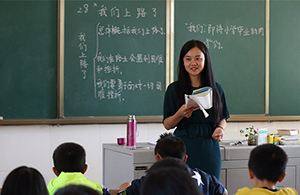Progress in judicial protection of rights
(China Daily) Updated: 2016-09-13 07:55
 |
|
A bailiff introduces visitors to a judge's robe at Fujian Provincial High People's Court in Fuzhou on the Open Day on Aug 25, 2016. [Photo/ZHENG SHUAI/CHINA DAILY] |
Editor's note: The State Council Information Office of the People's Republic of China on Monday issued a white paper on new progress in the judicial protection of human rights in China. Following is the full text of the document.
Foreword
Respecting and protecting human rights is a constitutional principle in China. It also reflects the will and pursuit of the Communist Party of China (CPC), the Chinese government and the Chinese people. The judiciary is the last line of defense to safeguard social fairness and justice, and judicial protection of human rights is an important part of human rights progress in a country. In recent years, especially since the 18th National Congress of the CPC, China has upheld the dominant position of the people, taking a people-first approach and ensuring that the people are the masters of the nation. The state strives to ensure the rights of the people, fully protects their interests, and promotes legislature based on rational analysis, strict law enforcement, judicial justice, and observance of the law by all citizens. Progress has been made in modernizing the system and capacity of state governance. China has effectively protected the people's rights and freedoms in an extensive array of fields in accordance with the law, while its people duly fulfill their obligations.
As China enhances the rule of law in all respects, new progress has been made in human rights protection in the field of justice. The reform of the judiciary has been driven to a deeper level, with improvements in the allocation of judicial powers and responsibilities, judicial accountability and opening-up, and the protection of lawyers' right to practice their profession. Channels of public participation in justice have been expanded, and the judicial protection of human rights has been improved. China has implemented a case-filing register system, revamped and improved its litigation system, and strictly enforced principles of legality, in dubio pro reo, exclusion of unlawful evidence. The state is resolute in preventing and correcting miscarriages of justice, and the procedures for protecting human rights in judicial practice have been raised to higher standards. The judiciary exercises its power independently and impartially in accordance with the law, leading to strengthened public credibility. Further efforts have been made in terms of state compensation and legal aid. Judicial fairness and justice is safeguarded, and citizens' rights are effectively protected. Crime suspects, defendants and criminals are treated in a more civilized manner, punishments are meted out in a more standardized way, and the personal dignity, safety, and legal property of detainees are all well protected, as are their rights of appeal, accusation, and impeachment.
There is no end to mankind's pursuit of progress. There is still much room for improvement for the rule of law in China. Strengthening judicial protection of human rights will continue to be a major task in implementing the rule of law. China will proceed from its prevailing reality, learn from the achievements of other countries regarding the rule of law, enhance judicial protection of human rights, safeguard social fairness and justice, and implement the rule of law in all respects.
I. Strengthen the Mechanism of Judicial Protection of Human Rights
China is striving to drive reform of the judiciary to a deeper level, allocate judicial powers and responsibilities in a more rational way, improve the judicial accountability system, promote judicial transparency, establish a national judicial assistance system, and ensure the right of lawyers to practice their profession and the rights of citizens to act as assessors and overseers.
Further improve the allocation of judicial powers and responsibilities, and ensure the independent and impartial exercise of the judicial and procuratorial power. Major plans for deeper reform of the judiciary were made at the 18th National Congress of the CPC and the third and fourth plenary sessions of the 18th Central Committee of the CPC. In 2014-2015, the Central Leading Group for Deepening Overall Reform held 19 meetings, 13 of which involved reform of the judiciary. The Group examined and approved 27 judiciary reform documents in total. Public security organs have improved the mechanism of law enforcement, changed the case-filing review system to case-filing register system, and strengthened examination and supervision of case admitting work. The Supreme People's Procuratorate has issued the "Opinions on Deepening Procuratorial Reform (Work Plan for 2013-2017)," and the Supreme People's Court has released the "Opinions on Deepening the Reform of People's Courts in All Respects-the Fourth Five-Year Reform Plan of the People's Courts (2014-2018)." Since 2014, pilot programs have been promoted nationwide to improve performance in the following areas: judicial accountability, category-based management of judicial personnel, job security for the judicial profession, and unified management of the personnel, finance and property of people's courts and procuratorates below the provincial level. The reform of trial-centered litigation is making headway.
In 2014, people's courts and people's procuratorates transcending administrative boundaries were established in Beijing and Shanghai, to handle major cross-regional criminal, civil and administrative cases. This was to address certain parties' concerns over the authority of the jurisdiction in charge of their cases, and to promote the unified and correct application of laws. In 2015, the Supreme People's Court set up its first and second circuit courts in Shenzhen and Shenyang for major cross-regional administrative, civil and commercial cases. In 2015 the circuit courts handled 1,774 cases and concluded 1,653 of them, concluding all cases within the time limit.
Improve the judicial accountability system, and enhance the central role of judges and prosecutors in case handling. We will improve the accountability systems of presiding judges, collegial benches, and prosecutors for the cases they handle. The powers and responsibilities of judges and prosecutors have been made clear, and they have lifelong accountability for the cases they adjudicate. A strict accountability system for misjudgments has been implemented. Thus a judiciary operation mechanism with clear distinction between and unification of powers and responsibilities, and well management has taken shape. The judiciary has reformed the signing of written judgments, with a clear provision that other than in cases decided by a judicial committee, the presidents, vice presidents and divisional chief judges will not review and sign the written judgments of cases they did not participate in. It has been made clear that presidents and divisional chief judges of people's courts are not allowed to air judgmental opinions on cases they did not hear, or negate the opinion of trial judges and collegial benches, unless they attended deliberations, on such cases at the judicial committees or meetings of judges with specialized knowledge.
Reform has been carried out in judicial committees. The deliberation sessions of judicial committees are recorded with audio-visual devices from beginning to end, and all committee members who have participated in the discussion and cast their votes must sign their names in the meeting minutes. A performance appraisal and internal public evaluation system has also been established for judicial committees. In pilot courts of Shanghai, the rate of cases handled independently by trial judges and collegial benches reached 99.9 percent of all cases, with only 0.1 percent of cases submitted to judicial committees for discussion.












